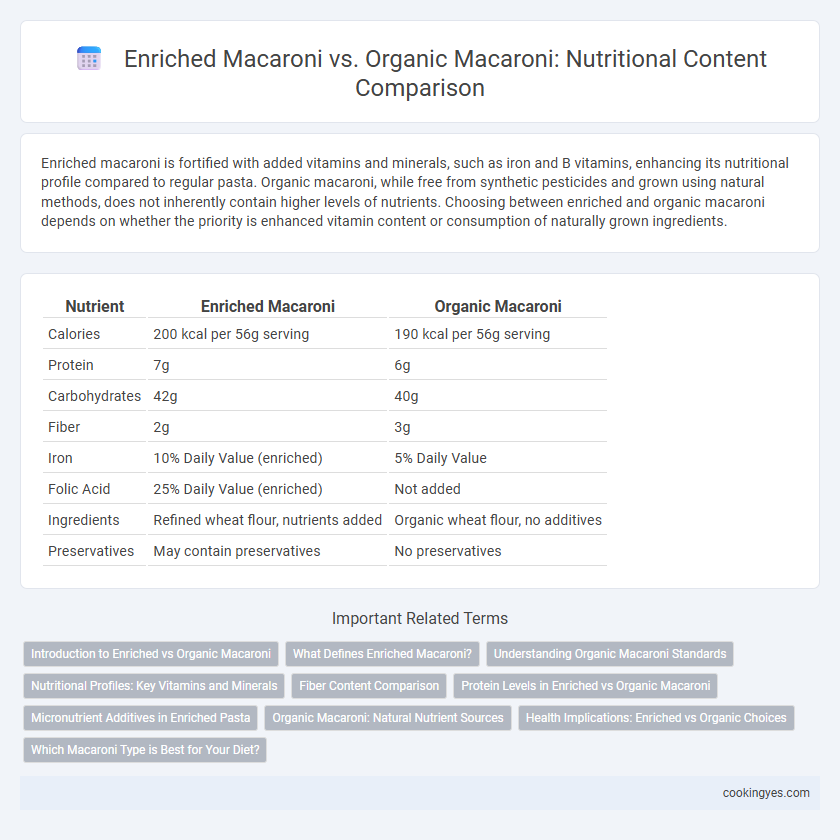Enriched macaroni is fortified with added vitamins and minerals, such as iron and B vitamins, enhancing its nutritional profile compared to regular pasta. Organic macaroni, while free from synthetic pesticides and grown using natural methods, does not inherently contain higher levels of nutrients. Choosing between enriched and organic macaroni depends on whether the priority is enhanced vitamin content or consumption of naturally grown ingredients.
Table of Comparison
| Nutrient | Enriched Macaroni | Organic Macaroni |
|---|---|---|
| Calories | 200 kcal per 56g serving | 190 kcal per 56g serving |
| Protein | 7g | 6g |
| Carbohydrates | 42g | 40g |
| Fiber | 2g | 3g |
| Iron | 10% Daily Value (enriched) | 5% Daily Value |
| Folic Acid | 25% Daily Value (enriched) | Not added |
| Ingredients | Refined wheat flour, nutrients added | Organic wheat flour, no additives |
| Preservatives | May contain preservatives | No preservatives |
Introduction to Enriched vs Organic Macaroni
Enriched macaroni contains added vitamins and minerals such as iron and B vitamins to replace nutrients lost during processing, enhancing its nutritional profile. Organic macaroni is made from organically grown wheat free from synthetic pesticides and fertilizers, appealing to consumers seeking natural food sources. Both options offer distinct health benefits, with enriched macaroni prioritizing nutrient restoration and organic macaroni emphasizing chemical-free cultivation methods.
What Defines Enriched Macaroni?
Enriched macaroni is pasta that has been fortified with essential nutrients such as iron, B vitamins (thiamine, riboflavin, niacin, and folic acid), which are often lost during the refining process. This enrichment aims to restore some of the nutritional value of whole grain products while maintaining a refined texture. In contrast, organic macaroni is produced from organically grown wheat without synthetic pesticides or fertilizers but may not necessarily be enriched with added nutrients.
Understanding Organic Macaroni Standards
Organic macaroni must meet strict USDA National Organic Program standards, ensuring it is produced without synthetic pesticides, fertilizers, or genetically modified organisms, which often results in higher antioxidant levels and fewer chemical residues compared to enriched macaroni. Enriched macaroni contains added vitamins and minerals such as iron and B vitamins to replace nutrients lost during processing, but it may lack the natural nutrient diversity and purity found in organic varieties. Understanding these organic standards highlights the nutritional benefit of organic macaroni's natural nutrient retention and absence of synthetic additives versus the controlled enrichment in conventional products.
Nutritional Profiles: Key Vitamins and Minerals
Enriched macaroni typically contains added vitamins and minerals such as iron, thiamine, riboflavin, niacin, and folic acid, which help restore nutrients lost during processing and support overall nutritional intake. Organic macaroni, made from organically grown wheat, often retains more natural nutrients but lacks the added fortification found in enriched varieties, resulting in a different vitamin and mineral profile. Understanding these distinctions is crucial for consumers seeking specific health benefits, particularly when prioritizing folate or iron intake versus preferring non-GMO and pesticide-free ingredients.
Fiber Content Comparison
Enriched macaroni typically contains lower fiber levels compared to organic macaroni, as its nutritional profile is fortified mainly with vitamins and minerals rather than dietary fiber. Organic macaroni, often made from whole grain or less processed wheat, retains more natural fiber, enhancing digestive health and satiety. Choosing organic macaroni provides a superior fiber content, supporting better gastrointestinal function and blood sugar regulation.
Protein Levels in Enriched vs Organic Macaroni
Enriched macaroni typically contains added nutrients such as iron, folic acid, and B vitamins but does not significantly enhance protein content compared to organic macaroni, which retains natural protein levels inherent to the durum wheat used. Organic macaroni may offer slightly higher protein values due to minimal processing and natural farming practices that can improve grain quality. Consumers seeking higher protein intake might prefer organic macaroni, though the difference in protein levels between enriched and organic varieties is generally modest.
Micronutrient Additives in Enriched Pasta
Enriched macaroni contains added micronutrient additives such as iron, folic acid, and B vitamins, which help address nutritional deficiencies common in processed grains. Organic macaroni naturally lacks these fortified nutrients but offers benefits like reduced pesticide exposure and higher antioxidant levels. Consumers seeking targeted micronutrient intake may prefer enriched pasta, while those prioritizing organic farming practices might choose organic macaroni despite lower micronutrient content.
Organic Macaroni: Natural Nutrient Sources
Organic macaroni is made from wheat grown without synthetic pesticides, herbicides, or fertilizers, preserving its natural nutrient integrity. It typically contains higher levels of antioxidants, vitamins, and minerals such as zinc and magnesium compared to enriched macaroni, which often relies on synthetic nutrient fortification. The absence of artificial additives in organic macaroni supports better nutrient bioavailability and promotes a healthier dietary profile.
Health Implications: Enriched vs Organic Choices
Enriched macaroni typically contains added vitamins and minerals such as iron, folic acid, and B vitamins, enhancing its nutritional profile but often involves refined grains. Organic macaroni, made from organically grown wheat, avoids synthetic pesticides and fertilizers, potentially reducing exposure to harmful chemicals. Choosing between enriched and organic macaroni depends on whether prioritizing nutrient fortification or chemical-free ingredient sourcing aligns better with health goals.
Which Macaroni Type is Best for Your Diet?
Enriched macaroni contains added vitamins and minerals such as iron, thiamine, and niacin, which help replenish nutrients lost during processing, making it a beneficial choice for those needing specific nutritional support. Organic macaroni, while free from synthetic pesticides and GMOs, typically retains its natural nutrient profile but may lack the fortification found in enriched varieties. Choosing the best macaroni for your diet depends on whether you prioritize added nutrient enrichment or prefer organic ingredients with minimal processing.
Enriched macaroni vs organic macaroni for nutritional content Infographic

 cookingyes.com
cookingyes.com